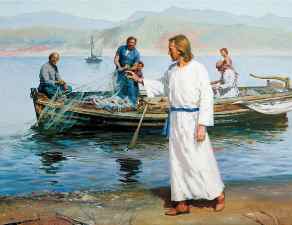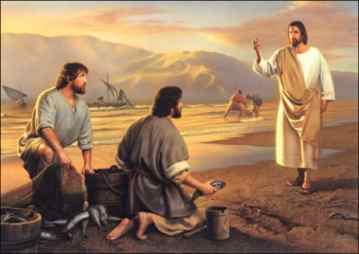Jesus Plus Nothing Bible Studies
Jesus Encounters: The Call of Peter - Grace for a sinner like us
by I Gordon
Previously we looked at the first meeting of the first disciples with Jesus. The next 'Jesus encounter' that I wanted to look at involves the calling of Peter to be a disciple of Jesus Christ. Peter is always interesting don't you think? He was not one to take a back seat but was always front and center, speaking his mind, for better or worse! But more than that, he was a man who knew his own heart. That can be a rare and precious thing. So let's look at this next encounter in Luke chapter 5.
Ever heard a sermon from a fishing boat?
Luke 5:1-3 Now it happened that while the crowd was pressing around Him and listening to the word of God, He was standing by the lake of Gennesaret; (2) and He saw two boats lying at the edge of the lake; but the fishermen had gotten out of them and were washing their nets. (3) And He got into one of the boats, which was Simon's, and asked him to put out a little way from the land. And He sat down and began teaching the people from the boat.
 With the crowd pressing in close, Jesus decided to use Peter's fishing boat as a good place to teach and preach from. It is a good choice. Practically speaking it obviously allowed the Lord some space in which to speak to the people. But it is also figurative of all teachers and evangelists that would speak to the masses (or the few!). J. Veron McGee puts it this way: 'The Lord climbed into Simon Peter's boat and asked him to push the boat out a little from the land. What a pulpit! I believe this illustration is both figurative and suggestive. Every pulpit is a "fishing boat," a place to give out the Word of God and attempt to catch fish. We should also consider that the Lord can use what we have (possessions and talents), if we put them at His disposal, for His glory. Notice also that Jesus sat down. Here was God, coming as a man, yet He was on their level. He did here exactly what He did when teaching the sermon on the Mount.
With the crowd pressing in close, Jesus decided to use Peter's fishing boat as a good place to teach and preach from. It is a good choice. Practically speaking it obviously allowed the Lord some space in which to speak to the people. But it is also figurative of all teachers and evangelists that would speak to the masses (or the few!). J. Veron McGee puts it this way: 'The Lord climbed into Simon Peter's boat and asked him to push the boat out a little from the land. What a pulpit! I believe this illustration is both figurative and suggestive. Every pulpit is a "fishing boat," a place to give out the Word of God and attempt to catch fish. We should also consider that the Lord can use what we have (possessions and talents), if we put them at His disposal, for His glory. Notice also that Jesus sat down. Here was God, coming as a man, yet He was on their level. He did here exactly what He did when teaching the sermon on the Mount.
Matthew 5:1-2 Now when he saw the crowds, he went up on a mountainside and sat down. His disciples came to him, and he began to teach them, saying...
Jesus never put Himself above others even though He had every right to do so. Sometimes today we put some Christian teacher or leader on a pedestal yet we err in doing so.
Do you like the deep?
(4) When He had finished speaking, He said to Simon, "Put out into the deep water and let down your nets for a catch."
Now, we need to remember that the fishermen were washing their nets. They had finished. They were tired. They either had a great catch and were ecstatic or were glum and downcast as you can be after a frustrating time out on the water! Peter has leant Jesus the use of his boat so He could teach the masses... but now Jesus wants to go fishing again!?! Really? They have just washed the nets... Argh! What would you be thinking if you were Peter?
We'll come back to what Peter thought in the next verse but notice also that Jesus wants to go out into the deep water. The biggest increase comes from deep water. Small fish or increase may be found in the shallows but a proper fisherman has to get out into the deep stuff. Spiritually speaking it can be the same. David found some of the difficulties that come in the deep waters 'Deep calls to deep in the roar of your waterfalls; all your waves and breakers have swept over me.' (Psalm 42:7) But he also learnt of the increase that comes as well. Jonah and Job would have agreed. Natural instinct is to crave where it is safe in the shallows. Jonah even used the Psalm in the prayer from the heart of the great fish: "For you have cast me into the deep, in the midst of the seas; and the floods compassed me about: all your billows and waves passed over me" (Jon 2:3). Sometimes the Lord asks us to step out into the deep. It isn't always comfortable but it is always for a good reason!
So what excuses would you come up with then aye?
(5) Simon answered and said, "Master, we worked hard all night and caught nothing, but I will do as You say and let down the nets."
What would be some valid excuses that Peter could have come up with to not go out again? How about: 'There is nothing out there. I know... I've just tried.' 'I'm too tired and need to get some rest.' 'Yeah, so you may have just seen that I've just cleaned the equipment?' 'Tomorrow is another day.' 'Actually nobody is getting any fish... Barry - did you get any fish? Not one. See? And they don't come out at this time of the day.' 'I'm a fisherman, you are a carpenter... I don't want to overly stress this point but you may wish to stick to your tables and chairs and let me deal with that which I know. I've fished these waters my whole life. I know every fish personally in these parts.'
Ok... so Peter isn't going to talk to the Lord like that... thankfully. But do we argue with the Lord? Sometimes we debate that which God has requested of us? Sometimes it might seem stupid. Sometimes it takes a while before we can come to the 'nevertheless...' that is in this passage: 'Master, we have toiled all night and caught nothing; nevertheless at Your word I will let down the net.' The 'nevertheless' is based on who it is who is asking. We need to remember that Jesus doesn't get people to do things for no reason.
(6) When they had done this, they enclosed a great quantity of fish, and their nets began to break; (7) so they signaled to their partners in the other boat for them to come and help them. And they came and filled both of the boats, so that they began to sink.
Now, I don't go fishing often but if I do I try to follow the instructions of the skipper. I know there is an art to it and I know if I am going to have any success then I need to listen to the one who hopefully knows what he is talking about! There is a principle here that goes far beyond fishing. If we are to have success then we must follow the Lord's instructions. They are given for a reason. Jesus knew were the fish were. Peter had been toiling and searching all night and all he got was a sore back and sun-burnt face! He had nothing to show for his efforts. Any Christian work must be directed by the Lord. 'Without Me you can do nothing' were the words of Jesus! And how the church can use up all its energy doing things that amount to nothing! Hearing God's word and being obedient is the key!
Notice also that it doesn't mean that following the Lord's word is straight forward... Peter followed the Lord's word and the nets broke and the boats started to sink! So we too may have 'problems' when following God's word. But, given the circumstances, these were good problems! J. Vernon McGee writes with insight on the broken net saying: 'In this instance the net broke. Later on, in the Gospel of John, a net overloaded with fish does not break. The fisherman's net illustrates a truth. At this point there is no net that can hold the fish for the simple reason that He has not yet died and risen from the dead - that is the gospel. The "net" which will hold fish must be one that rests upon the death and resurrection of Christ - at this time there had been no death and resurrection. The net broke. After His death and resurrection, He told them how to fish and the net did not break (see Joh_21:1-11).
A broken net leads to a broken heart
(8) But when Simon Peter saw that, he fell down at Jesus' feet, saying, "Go away from me Lord, for I am a sinful man!" (9) For amazement had seized him and all his companions because of the catch of fish which they had taken; (10) and so also were James and John, sons of Zebedee, who were partners with Simon. And Jesus said to Simon, "Do not fear, from now on you will be catching men."
Peter has a very interesting reaction to this experience. He sees his won sinfulness and wonders why the Lord would 'hang out' with him? What gives a man this type of reaction or experience? Peter actually wants Jesus to go away from him. Why is that? Clearly he doesn't feel worthy enough to be with the Lord for the goodness of God is breaking our man Peter. The contrast between Jesus' goodness and Peter's own heart is too much for him to take. He cannot comprehend how the Lord could be so good for one such as him! Is that a reaction or experience you have had? Have you seen the goodness and grace of God even in the midst of seeing your own heart and been amazed at God's love for you?
Jesus responds by telling Peter not to fear. He says, in effect - 'I know you - I know what you are like. And I still want you to follow me. Don't be afraid - just follow me and see what you become!' And what did Peter become and how many did Peter catch? He became an Apostle who preached with courage and clarity on the day of Pentecost leading to about 3000 being saved! Awesome!
Luk 5:11 When they had brought their boats to land, they left everything and followed Him.
 Here you have the best day's catch they have ever had! This is as good as it gets for a humble Galilean fisherman! It is the biggest load for the market and, to put it simply, could set them up for a while from the tidy little fishy profit they are about to receive... Yet what was their response to this miracle of Jesus and potential money earner for them? It says that they left everything and followed Him. Wow!
Here you have the best day's catch they have ever had! This is as good as it gets for a humble Galilean fisherman! It is the biggest load for the market and, to put it simply, could set them up for a while from the tidy little fishy profit they are about to receive... Yet what was their response to this miracle of Jesus and potential money earner for them? It says that they left everything and followed Him. Wow!
What is it that can cause a man or women to walk away from money or possessions or fame or a successful career? It is eternal purpose. It is knowing that the call is coming from the Almighty God who created the Heavens and the Earth. It is knowing that the call of God, unlike the things of the world, lasts forever! These humble fishermen could drop and leave all that they knew because it was Jesus that asked them. What a privilege it is to follow and serve the Lord - the King of Kings!
One last passage on the call of John...
Matthew 4:18-22 Now as Jesus was walking by the Sea of Galilee, He saw two brothers, Simon who was called Peter, and Andrew his brother, casting a net into the sea; for they were fishermen. (19) And He *said to them, "Follow Me, and I will make you fishers of men." (20) Immediately they left their nets and followed Him. (21) Going on from there He saw two other brothers, James the son of Zebedee, and John his brother, in the boat with Zebedee their father, mending their nets; and He called them. (22) Immediately they left the boat and their father, and followed Him.
 One last point before closing... In Mathews account we read of James and John as well. While Peter and Andrew were fishing when Jesus met and called them, James and John were mending the nets. It is easy to read over such small details but it is
One last point before closing... In Mathews account we read of James and John as well. While Peter and Andrew were fishing when Jesus met and called them, James and John were mending the nets. It is easy to read over such small details but it is
Bill Randles, in his book 'Mending the nets' writes the following:
The Chinese pastor, author and martyr, Watchman Nee, in his book 'What Shall This Man Do ?', made an interesting observation about the careers of the three apostles, Peter, Paul and John. Nee observed that there is spiritual significance in the occupations that these three were engaged in when they were called by Jesus.
We are told in Scripture that when Peter was called, he was busy as a fisherman, 'casting his nets into the sea'. Paul happened to be a tentmaker by trade, crafting portable dwelling places. John, the beloved apostle, was also a fisherman, but when Jesus first called him he was on the shore with brother James, and they were mending their nets.
Peter comes forth first, on the day of Pentecost, throwing out the net, preaching the Gospel boldly. It was also Peter, who was the first of the apostles to go directly to the Gentiles with the Word of the cross. The first half of the book of Acts features Peter prominently. Paul comes next into prominent ministry. But his calling is different. It is true that Paul was an effective evangelist, but to him also was given revelation from Jesus Christ which became vital to the building of the house of God; the church which is the 'dwelling place of God in the Spirit'. Paul was given the task of building the house of God, through the revelation given to him as a 'wise masterbuilder' and steward of the mysteries of God. He was used to build upon the foundation which had already been laid - none other than Jesus Christ himself.
Finally at the end, John comes forth. He had been there at the beginning with Peter and the others, but not as prominently as Peter or Paul. He comes not to initiate as Peter, nor to build as Paul; his primary thrust is akin to 'repairing the nets'. John comes at the end of the New Testament, long after Peter has put down his nets and launched out into the Gentile world, and even after Paul has built the house of God through the revelation given to him... By the end of the first century, false concepts of Jesus, the gospel, and spirituality had threatened to completely redefine Christianity, to the point of obliterating the true gospel. The nets needed to be repaired.
John offers nothing new. His task is to call us back to that which is original, that which was from the beginning . . . (I John 1:1) that, living in this late hour, we might ' . . .strengthen the things which remain . . .' (Revelation 3:2), and that we might remain in 'Him that is true . . . even in His Son, Jesus Christ, the true God and eternal Life' (I John 5:20).
